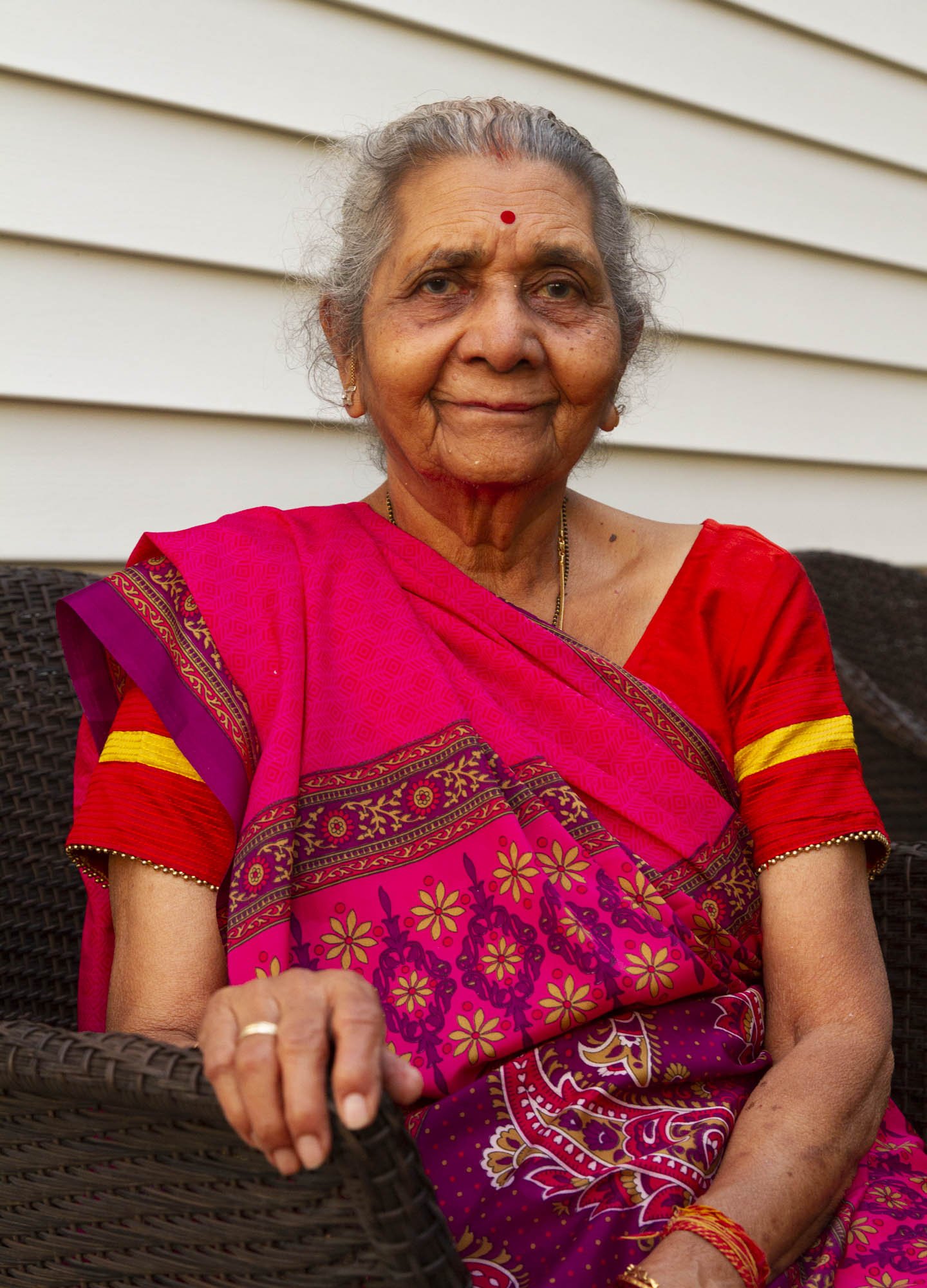Saroj Sharma
“I can [say I’m] Southern. Because always, I stayed here. So I have to be. It’s all learned from here.”
Saroj Sharma, 89, is one of the founders of the Hindu Society of North Carolina. / Photo by Maydha Devarajan.
Nestled just off Aviation Parkway in Morrisville, N.C., the Hindu Bhavan is more than just a mandir. It’s a dream turned into reality.
Thousands of Hindu South Asians across the state make the Hindu Society of North Carolina’s temple their place of worship. Generations have been raised in its halls, which have seen milestone after milestone (I can attest, having witnessed the blessing of both babies and cars in the temple’s parking lot). And over the course of just a few decades, the HSNC’s community has grown exponentially, which can largely be owed to two people: Saroj and Gangadhar Sharma.
Photo courtesy of Saroj Sharma.
Saroj Sharma was born in Kanpur, in the state of Uttar Pradesh in 1932.
At the age of 17, she married Gangadhar Sharma, and together they started a family in Lucknow, a neighboring city and the capital of Uttar Pradesh. After a series of stints across the globe in Nigeria and Canada while Dr. Sharma finished his Ph.D. in entomology at McGill University, the Sharmas and their children eventually settled down in North Carolina in 1972.
Photo courtesy of Saroj Sharma.
Photo courtesy of Saroj Sharma.
For years, the two held gatherings in their home for the few other South Asians in the area at the time. Sharma would cook elaborate feasts for Indian graduate students at N.C. State University, and on the weekends, Dr. Sharma would teach stories of the Ramayana and Hindu philosophy to their friends’ children.
Just four years after they moved, they registered the Hindu Society of North Carolina, and in 1978, Sharma purchased a church near Pullen Park for a physical place of worship. But that search for a permanent sense of community wasn’t over.
In a dream, she says, the goddess Devi came to her.
“’I’m coming in 1986, you build my temple,’” Sharma recalls. “I say, ‘I have no money.’ She said, ‘You can fundraise. Get up.’”
The community raised $50,000, she said. The Sharmas even put their house up as collateral, where it remained for 18 years, to borrow money to support the construction of the HSNC. The temple opened in 1986, with Sharma as president.
It’s not difficult to see how she fostered her community.
Saroj Sharma prays at the Hindu Society of North Carolina temple in Morrisville. / Photo by Maydha Devarajan.
When I visited her at the temple, the 89-year-old sat perched on a chair at the front of the hall, speaking into a microphone with a sense of warmth and confidence. She switched with ease between cracking jokes in Hindi, watching as laughs ripple through the prayer group, and then quickly assuming the role of a leader, a respected elder directing the order of events and bhajans.
Now, 30 years after seeing the temple open and having spent more than half of her life in a country she wasn’t born in, the stalwart of her local community and a matriarch figure to many reflects on her identities and the changes she has seen in the Triangle.
Saroj Sharma surveys the crowd gathered for the prayer group for older members of the community at the Hindu Society of North Carolina temple in Morrisville. / Photo by Maydha Devarajan.
“I think that's our Indian culture…They say God is never going to be happy unless you serve the humanity. So humanity is the first part to serve to. And then always, I think, they are my children, you know, they don't have food. I feel so bad, you know, ‘Oh, I can take good food to my children.’ They are also children. Come and eat.”
Photo courtesy of Saroj Sharma.
In our interview, Sharma shares everything from the challenges of establishing the temple and encounters with the KKK to her thoughts on Southern identity (which she claims wholeheartedly) and taking a whole generation of first generation immigrants under her wing.
Saroj and Gangadhar Sharma still reside in Morrisville, a short drive from the temple and in the middle of an ever-expanding South Asian community.
Saroj Sharma poses for a portrait outside her home in Morrisville. / Photo by Maydha Devarajan.








